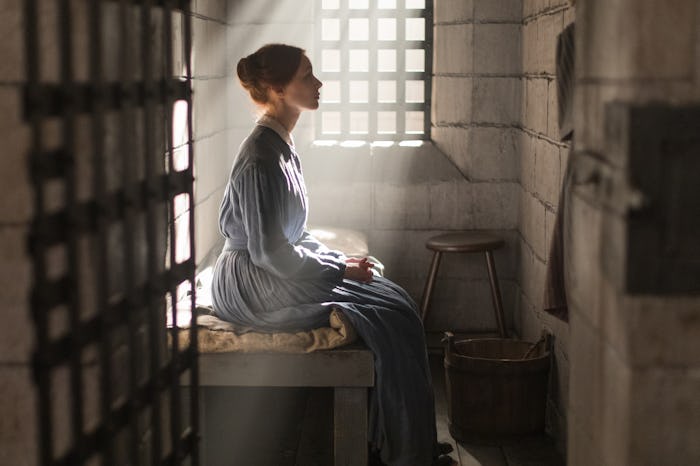Entertainment

Netflix's 'Alias Grace' Has A Very Important Connection To 'The Handmaid's Tale'
It's safe to say that The Handmaid's Tale was one of the defining TV shows of 2017 — for a few reasons. First and foremost, it seems like an eery (but not impossible) dystopia that United States politics is inching closer and closer towards. Secondly, it was practically universally renowned, and swept the Emmy's this year. Now, Netflix is taking the reins from Hulu and adapting another Margaret Atwood novel: Alias Grace. So what book is Alias Grace based on? Margaret Atwood is a prolific author and streaming sites are (finally) bringing her work to life.
Alias Grace is a novel that was released in 1996. It takes place in 19th century Canada and follows convicted murderer Grace Marks. The novel itself is historical fiction, but Marks was a real person, and some of the events actually took place. In 1843, Irish immigrant and servant Marks was sentenced to life in prison for the murder of her employer, Thomas Kinnear, as well as his pregnant mistress (and housekeeper) Nancy Montgomery. An accomplice, James McDermott, was hanged for the crime. Given Mark's gender and age (she was a teenager at the time of the murder) and the fact that she was beautiful, the case became sensationalized. Marks was pardoned and released 30 years later, though what happened to her afterwards is unknown.
Atwood wasn't the first person to write about Marks' story. In 1853, a decade after Marks was sentenced, Susanna Moodie wrote her own account in Life in the Clearing. Atwood read Moodie while a student at Harvard University, and was enthralled with the case. Alias Grace wasn't even the first time Atwood herself wrote about Marks: she wrote the play The Servant Girl, which was taped and released by CBC in 1974. CBC is a co-producer of Alias Grace along with Netflix, so they've been familiar with Marks for a long time as well.
Atwood was fascinated with different aspects of life, and it shows in Alias Grace. "This novel is set in the Victorian period, a period this you might say is the period of dreams," Atwood told CBC about Alias Grace. "It's when they become very important. I think dreams are part of people's lives — and if you are going to show a character you have to show their dreams. There was a huge interest into the workings of the mind (at that time)."
Another aspect was the treatment of female criminals; why was Marks sentenced to prison, while McDermott was hanged? I'm excited to see how this will all play out in the Netflix adaptation.
Viewers may wonder why a show about Alias Grace is released now, over 20 years after the novel was published. It may be riding the coattails of The Handmaid's Tale (which was also released years after the novel's publication), but it was also made possible by a letter from a teenage girl. Sarah Polley, then a Canadian child star, wrote a letter to Atwood after reading Alias Grace right after it was published. Polley wanted the movie rights to the novel... but Atwood declined. She didn't give up, however, and is now the writer and producer of the adaptation.
The screen rights for Alias Grace were up for the taking in 2012, and Polley finally got her longtime wish. Polley recognizes the story's importance, along with Atwood's other work. "The Handmaid’s Tale offers us a window into a possible future when women’s rights are eroded. Alias Grace offers a look at what it was like before women had any rights," Polley told The Independent. "To look back and forward is very important at this moment when women’s rights are incredibly precarious and fragile." Seeing as Polley is such a big fan, I'm sure her interpretation will be faithful and enthralling.
Watch Romper's new video series, Romper's Doula Diaries:
Check out the entire Romper's Doula Diaries series and other videos on Facebook and the Bustle app across Apple TV, Roku, and Amazon Fire TV.